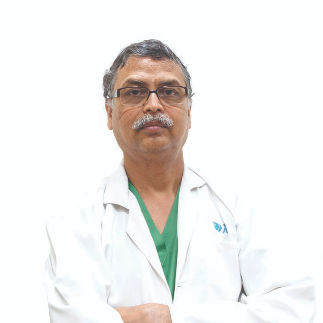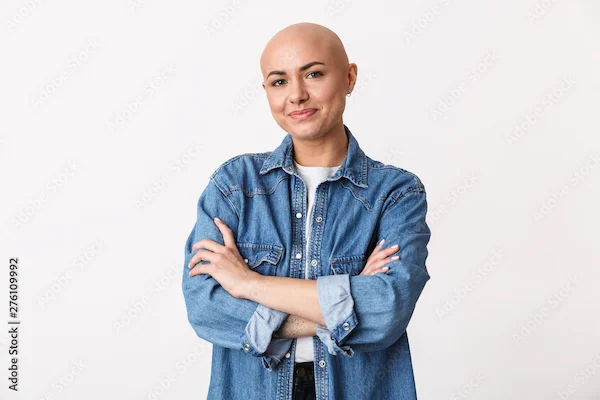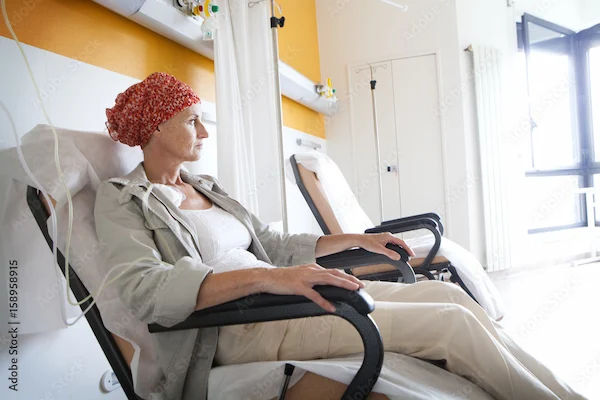Cancer Immunotherapy Mechanism
Cancer immunotherapy uses the patient’s immune system to fight cancer by specifically targeting cancer cells.

Written by
Last updated on 3rd Jul, 2025
Cancer immunotherapy has improved oncology by leaps and bounds and offers patients hope by using the body’s immune system to fight cancer. Immunotherapy, unlike chemotherapy or radiation treatment, boosts immune response, making it an effective long-term cancer-fighting method. Cancer immunotherapy is used to target and destroy cancer cells in the body using the immune system.
Immunotherapy comes in various forms, but it always involves training the immune system to differentiate cancer cells from normal cells and fight the malignant cancer cells.
Immunotherapy dates back to the late 19th century when Doctor William Coley used bacterial toxins to boost the immune system against cancer. Over the years, advances in molecular biology and immunology have paved the path for innovative treatments such as adoptive T-cell therapy and immune checkpoint inhibitors.
Basic Principles of Immunotherapy
At its core, immunotherapy works on the principle of distinguishing cancer cells from healthy ones due to the presence of abnormal proteins. Immunotherapy targets these cancer cells even if they adopt evasion tactics and helps boost immune response.
1. Understanding the Immune System's Role in Fighting Cancer
The immune system has two main components: innate immunity (non-specific defence mechanisms) and adaptive immunity (specific responses mediated by T-cells and B-cells).
Tumour cells often bypass immune detection by:
Producing proteins that prevent immune activation
Reducing visibility to immune cells
Creating an immunosuppressive environment around the tumour
Immunotherapy can help reactivate immune cells, particularly T-cells, allowing them to recognise and effectively kill cancer cells.
2. Distinct Types of Immunotherapeutic Agents
Immunotherapy includes various agents, each meant to act at a specific stage of the immune response. These include monoclonal antibodies, cancer vaccinations, immune checkpoint inhibitors, and adoptive cell therapies.
Each type offers unique benefits and is appropriate for specific cancers.
Types of Cancer Immunotherapy
Various immunotherapy approaches target and boost immune responses to improve patient outcomes. Here are a few of them.
1. Monoclonal Antibodies
Monoclonal antibodies use lab-engineered antibodies to mimic natural antibodies to help fight infection against specific antigens. MABs target these antigens to:
Mark cancer cells for destruction by immune cells
Deliver toxic agents directly to cancer cells while preserving healthy tissue
Block the growth signals that tumour progression needs
2. Immune Checkpoint Inhibitors
Checkpoint inhibitors are a kind of immunotherapy. These medications block specific proteins known as checkpoint proteins, which prevent the immune system from targeting cancer cells.
Immune checkpoint inhibitors can also help cure other cancers, including melanoma, skin cancer, and lung cancer.
3. Cancer Vaccines
Cancer vaccines are a type of immunotherapy that can help teach the immune system how to recognise cancer cells so that it can identify and destroy them.
Sipuleucel-T is an example of a common cancer vaccine. It uses patient-derived dendritic cells with tumour antigens to treat prostate cancer.
4. Adoptive Cell Therapy
The goal of adoptive cell therapy (ACT) is to improve a patient’s immune cells’ capacity to fight cancer. CAR-T cell therapy is a breakthrough ACT method where T-cells are modified to express chimeric antigen receptors (CARs) to recognise specific cancer antigens.
Tisagenlecleucel is a type of CAR-T therapy that has helped contain certain lymphomas and leukemias with an overall 63% survival rate in a 3 year period.
Consult Top Experts for Personalised Treatment
Mechanisms of Action
Immunotherapy’s mechanism of action shows how these cutting-edge therapies interfere with cancer’s evasion and boost the immune response.
1. How Immunotherapy Targets Cancer Cells
Immunotherapy is a type of treatment that targets specific parts of the immune system to fight cancer. It works by:
Improving the immune system’s ability to detect tumour antigens
Boosting immune cell persistence and activity
Interfering with immune evasion methods of cancer cells
2. Enhancing T-Cell Response
T-cells are at the centre of the action when it comes to fighting cancer. Immunotherapy strengthens T-cell responses through checkpoint inhibition, direct T-cell engineering, or cytokine stimulation.
Boosting T-cells helps in creating a more solid and sustained attack on tumours.
3. Overcoming Tumour-Induced Immune Suppression
Immunotherapy helps disrupt the suppressive environment that cancer cells form by using regulatory T-cells (Tregs) or myeloid-derived suppressor cells (MDSCs).
Preventing the growth of the suppressive environment helps in better immune cell infiltration and activity with the tumours.
Benefits of Cancer Immunotherapy
Immunotherapy offers various benefits over traditional therapies, such as:
Distinctness: Immunotherapy only targets cancer cells, sparing normal tissues.
Longevity: Immunotherapy reduces the risk of recurrence, hence promoting long-lasting immune memory.
Combination Potential: It can be used alongside chemotherapy, targeted or radiation therapy for better effectiveness.
Immunotherapy works very well on certain illnesses, including cancer, but it's also being researched for other ailments, such as autoimmune diseases. Eligibility for the treatment is decided by:
Cancer type and stage
Presence of specific biomarkers, like PD-L1 expression or microsatellite instability (MSI)
Overall health and ability to tolerate potential side effects
Immunotherapy’s effectiveness often comes down to its ability to provide long-lasting responses. Even after the conclusion of treatment, the immune system continues to monitor and destroy residual cancer cells.
Side Effects and Challenges
While immunotherapy is effective, it comes with various challenges and side effects which need careful management.
Some of the common side effects of immunotherapy are:
Gastrointestinal problems, like colitis or diarrhoea
Flu-like symptoms such as chills, fever, exhaustion, and muscle aches
Respiratory issues with persistent coughs or trouble breathing
Any symptoms that patients have during (or after) immunotherapy treatments should be discussed with a healthcare professional, regardless of how minor or insignificant they may seem.
Current Research and Innovations
Immunotherapies’ potential is growing owing to the never-ending research. Some of the recent advancements include:
Oncolytic viruses: These viruses are engineered to trigger an immune response while specifically infecting and killing cancer cells.
Neoantigen vaccines: This tailored vaccination targets specific cancer mutations in the patient.
Bispecific antibodies: Molecules known as bispecific antibodies attach to T-cells and cancer cells, bringing them closer to targeted killing.
Future Directions and Clinical Trials
Cancer immunotherapy has become a promising treatment method, leveraging the immune system to fight cancer. Breakthroughs in cancer vaccines, CAR T-cell therapy, and immune checkpoint inhibitors have shown life-saving potential.
Some of the promising areas discovered through clinical trials include:
Improving immune infiltration by modulating tumour microenvironments
Eliminating the need for patient-specific cell engineering by using universal CAR-T cells
Combining CAR-T cells with immune checkpoint inhibitors
Prognostic Factors for Success
Prognostic factors can help offer insight into why some patients benefit more than others.
1. Biomarkers for Predicting Response
Biomarkers play a vital role in identifying patients that can benefit from immunotherapy. These include:
Tumour mutational burden (TMB): Higher mutation increases the presence of neoantigen, boosting immune recognition.
PD-L1 expression: This indicates the potential response to checkpoint inhibitors.
2. Influence of Genetic and Environmental Factors
Immunotherapy’s effectiveness may be impacted by genetic variations like mutations in KRAS or BRCA1/2 genes. There are still ongoing investigations that environmental factors like diet and microbiome composition have on treatment results.
Conclusion
Cancer immunotherapy has revolutionised oncology by using the immune system to fight cancer. These methods, ranging from CAR T-cell therapy to monoclonal antibodies, interfere with cancer’s evasion methods and provide long-lasting control.
It makes sense that immunotherapy’s future depends on innovation, accessibility, and personalisation. It has the potential to revolutionise cancer treatment through continued research and clinical trials, giving hope to millions around the world.
Consult Top Oncologists
Consult Top Oncologists

Dr. Rupam Manna
Radiation Specialist Oncologist
4 Years • MBBS MD(RADIO THERAPY)
Barasat
Diab-Eat-Ease, Barasat

Dr. Amit Choraria
Surgical Oncologist
18 Years • MBBS, MS (Surgery) Fellow, Surgical Oncology, Tata Medical Center (FSO) Fellow, European Board of Surgery (Surgical Oncology) (FEBS) Fellow, Minimal Access Surgery (FMAS) Fellow, Indian Association of Gastrointestinal Endosurgeons (FIAGES) UICC Fellow, Royal Marsden NHS, London, UK Visiting Scholar, Plastic Reconstructive Surgery, CGMH, Taiwan Fellow, Robotic Surgical Oncology, Vattikuti Foundation, USA
Kolkata
Apollo Multispeciality Hospitals , Kolkata, Kolkata
(50+ Patients)

Dr Gowshikk Rajkumar
Oncologist
10 Years • MBBS, DMRT, DNB in Radiation oncology
Bengaluru
Apollo Clinic, JP nagar, Bengaluru

Dr. Praveen Kumar Garg
Surgical Oncologist
26 Years • MBBS, M.S.(Gen.Surg.), M.Ch.(OncoSurg.)
Delhi
Apollo Hospitals Indraprastha, Delhi
(50+ Patients)

Dr. Gopal Kumar
Head, Neck and Thyroid Cancer Surgeon
15 Years • MBBS, MS , FARHNS ( Seoul, South Korea ), FGOLF ( MSKCC, New York )
Delhi
Apollo Hospitals Indraprastha, Delhi
(25+ Patients)
Consult Top Experts for Personalised Treatment

Dr. Rupam Manna
Radiation Specialist Oncologist
4 Years • MBBS MD(RADIO THERAPY)
Barasat
Diab-Eat-Ease, Barasat

Dr. Amit Choraria
Surgical Oncologist
18 Years • MBBS, MS (Surgery) Fellow, Surgical Oncology, Tata Medical Center (FSO) Fellow, European Board of Surgery (Surgical Oncology) (FEBS) Fellow, Minimal Access Surgery (FMAS) Fellow, Indian Association of Gastrointestinal Endosurgeons (FIAGES) UICC Fellow, Royal Marsden NHS, London, UK Visiting Scholar, Plastic Reconstructive Surgery, CGMH, Taiwan Fellow, Robotic Surgical Oncology, Vattikuti Foundation, USA
Kolkata
Apollo Multispeciality Hospitals , Kolkata, Kolkata
(50+ Patients)

Dr Gowshikk Rajkumar
Oncologist
10 Years • MBBS, DMRT, DNB in Radiation oncology
Bengaluru
Apollo Clinic, JP nagar, Bengaluru

Dr. Praveen Kumar Garg
Surgical Oncologist
26 Years • MBBS, M.S.(Gen.Surg.), M.Ch.(OncoSurg.)
Delhi
Apollo Hospitals Indraprastha, Delhi
(50+ Patients)

Dr. Gopal Kumar
Head, Neck and Thyroid Cancer Surgeon
15 Years • MBBS, MS , FARHNS ( Seoul, South Korea ), FGOLF ( MSKCC, New York )
Delhi
Apollo Hospitals Indraprastha, Delhi
(25+ Patients)


